YCDC Co-Directors Honored By The Windward School
We had looked forward to the 2018 Windward Benefit Gala with great anticipation and yet were not quite prepared for the outpouring of gratitude and joy that greeted Bennett and me.
At the benefit gala held at Cipriani42 in New York City on March 12th, we were excited and somewhat humbled to be together with journalist Anderson Cooper and Blackstone Group Chairman Stephen and Christine Schwarzman as honorees.
The benefit itself was beautiful and filled with over 600 energized parents and educators who all truly cared about both Windward school and dyslexia.
Windward is recognized across the country and around the world as a leader in providing instruction to children with dyslexia. A coeducational, independent day school with campuses in White Plains and New York City, Windward has an enrollment of 862 students this school year.
What touched me so very much were the scores of parents, at times, literally lining up to share how much my book Overcoming Dyslexia, our Yale Center for Dyslexia & Creativity (YCDC) and together our and YCDC’s work, both scientific and in raising public awareness and ensuring better understanding of dyslexia had changed their and their child’s life for the better. What an extraordinary exchange of hugs, tears and smiles. Often, it was “I just wanted to meet you.” or “Thank you, thank you.” I also heard how much so many creative young dyslexic boys and girls were doing to help, for example, forming advocacy groups, distributing materials or sharing that they were dyslexic and proud. During dinner, this continued with not only parents but educators stopping by our table to offer how excited they were to meet us at this event and couldn’t wait to tell colleagues of our meeting. My big worry? I was so filled with gratitude I felt that my heart would burst.
One of my very favorite education leaders, Dr. John Russell, Head of School at Windward, told the audience that “it’s going to take a concerted effort” to make the much needed changes nationwide to the education of children like those boys and girls who are fortunate enough to attend Windward.”
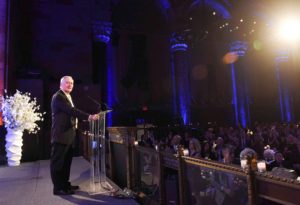
Dr. Russell
“For far too long, schools have underestimated and undereducated our children,” Dr. Russell said. He ended on a hopeful note: “I see a future where the unique skills and creativity of dyslexics are recognized and valued.”
We were deeply humbled by Dr. Russell’s remarks, in which he praised Bennett and me for “their commitment to dyslexic students and their families,” noting that their “brilliant work as researchers has been the foundation for our understanding…”
Dr. Russell went on to express: “We’re indebted to the Shaywitzes for all they have done – not only for dyslexic students but for all students.”
Bennett and I were introduced by Skye Lucas, a young woman whom we first came to know when she struggled to read very early in her schooling, was diagnosed with dyslexia and began a wonderful, close relationship with us and YCDC. Skye attended Windward, learned to read and then went on to independent schools in NYC, where she met with a range of support intermingled, at times, with harmful ignorance of dyslexia. We remained very close and I was very proud to have been the subject of Skye’s bat mitzvah speech.
“If not for my family and the Shaywitzes, I would not be the curious, confident thinker that I am today,” Skye said. “They always made time to talk to us.”
“The Windward School and the Shaywitzes gave me the grit and the gumption to major in ‘unafraid,’” Skye emphasized, noting that she has helped to educate legislators in Washington DC to raise their awareness of dyslexia.
To more fully appreciate the trajectory of Skye’s transformation into her current ‘unafraid,’ it is valuable to recall from where she has come. As Skye told us, “After many afternoons spent in the nurse’s office due to “stomach aches”, numerous recesses spent indoors because of error heavy assignments, and countless evenings spent at the kitchen table with my parents struggling to complete home- work, learning felt like torture and I tried to avoid school at all costs.”
She continued:
This might sound familiar to many people in the room.
My father was frustrated and my mother felt sorry. So like the smart and caring woman she is, she did her research, spoke to family, friends, and friends of friends.
Eventually, she found a book called Overcoming Dyslexia by Dr. Sally Shaywitz. Immediately, I was tested for dyslexia. Once I was diagnosed, my mother presented the results to the school, thinking they would know how to help me and be compassionate.
Well, I was counseled out of first grade. What at first appeared detrimental to my future proved to be tough luck.
Soon, in a tiny language arts class, with three other students, I was learning how to “crack the code”, I learned how read and write, and I learned how to learn. At Windward, anxiety and isolation were absent, and scholarship filled the campus’ halls.
Were it not for my privilege, my family, Windward, and the Dr. Shaywitzes I would not be the proud, accomplished, and curious thinker I am today.
Even as a world thought leaders, Drs. Sally and Bennett Shaywitz always had time to speak to my mom and me. Whether over the phone or in the halls of the Capitol they made both of us believe that dyslexics were smart, and that I would thrive. And, yes, they are also avid advocates for dyslexia legislation, but I’ll touch more on that later.
The Shaywitz’s support and empowerment were universal. Showcased on their brilliant website, dyslexia.yale.edu, are resources and tools for those in need as well as a list of notable and accomplished dyslexics.
The encouragement was contagious, and my mom began to point out all distinguished dyslexics. Actually, a select few are in this room. When I was younger, my mom introduced me to CNN, not because it was a great news source, but because their leading anchor Anderson Cooper, is dyslexic!
By the time I left and returned to mainstream school, Windward and the Shaywitz’s gave me the grit and gumption to major in “unafraid.”
The thing with dyslexia, is that its never over! Its a love hate relationship. Whether its learning in a new classroom, with a new teacher, trying to spell White Plains in the GPS as “white” and not “wyt”, navigating which side is your left and your right so you can tell the cab driver to pull over at the right destination, dyslexia will al- ways test our character and patience.
Recently, I found myself in another school after Windward that would not give me my extra time and trivialized my diagnosis. With their advice and encouragement, the Shaywitz’s and Windward gave me the courage to transfer after Thanksgiving in my sophomore year of high school. On one particularly bleak day, Dr. Sally Shaywitz invited me to accompany her to DC to hear the first scientific testimony on dyslexia ever presented to the US Science Committee.
Windward and the Shaywitz’s saw the potential in us when others did not.
The Dr. Shaywitz’s spend their life fighting for dyslexic children to believe they are smart every day. She has been our Rosa Parks and led a scientifically validated movement for civil rights. They also created a think tank called the Yale Center for Dyslexia & Creativity. There, dyslexic brains are cherished and celebrated for their unique accomplishments.
You’ve given us back our dignity. You’ve believed in us. Your research has changed lives.
Tonight, we celebrate you and your achievements and we thank you for your tireless devotion to making sure all of us are seen for who we can be.
My family wanted to get you a special present to mark this occasion. We have arranged to dedicate a classroom in your honor at the Windward school. All the kids who learn in that room, will be a tribute to you and your brilliant work.”
Skye shared a sweet touch with us. She told us that she and her dyslexic brother Hayden (also a Windward alum) had cavorted through the hallways and visited the rooms at Windward to choose the one that meant the most to them and would serve as a symbol of how much both we and Windward had meant to each of them. Skye was happy to share that they had selected a large, bright room filled with light and one that looked out at the water. That made Bennett and me smile broadly as well.
Skye concluded her introduction with these words about a very special member of the Windward educational community, “It has been a great honor to share this podium with esteemed alumni, dedicated faculty, and compassionate individuals. I also would like to end with a special thank you to Maureen Sweeney for accepting me at this wonderful school, and continuing to cheer for me since you met me in first grade.”
What does or can one say when your introduction is met with a standing, thunderous ovation? Thank you, we will continue to work nonstop to earn your trust and gratitude. There is much we want to accomplish.
It is always difficult in choosing your words in a situation like this, where there is so very much you want to share with so little time to say all that you want to. In accepting the award, we thought it very important to disabuse those gathered of the notion that slow readers cannot be incredibly fast thinkers. With this in mind we shared that, “our findings proved the unexpected nature of dyslexia – that is, in dyslexia – you can at the same time, have a very high level of intelligence and read at a much lower level. This is something Windward knows very well and is demonstrated in its students. It is important that the children themselves know that they are both dyslexic and smart.”
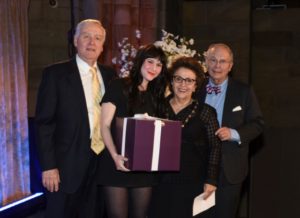
Windward alum Skye Lucas together with Dr. Russell, Dr. Sally Shaywitz and Dr. Bennett Shaywitz
I noted, too, that “as my wonderful mentee Skye just indicated, we are physician-scientists at Yale who both study and care deeply about children and adults who are dyslexic. Caring as deeply as we do about dyslexia, we plan our studies to address questions especially relevant to those who are dyslexic. For example, we carry out brain imaging studies allowing us to see the reading brain at work resulting in our discovery of the neural signature for dyslexia – a validation that yes, dyslexia is indeed real. This key finding has now been replicated in studies around the world.
We also lead a unique on-going longitudinal study of a large population of children recruited at kindergarten entry at age 5, monitored yearly to the present when they are now adults approaching age 40. What is so special about this population is that we followed all children—not knowing when they were age 5 years who would be good readers and which children would be identified as dyslexic; and can now identify early signs of dyslexia.
I emphasized, too, one of our most important findings, one that implores us to act. We were very excited most recently when we discovered that the achievement gap in reading-between typical readers and dyslexic readers is already present as early at first grade and persists! Once we discovered this, we knew we had to act and act we did. This finding prompted us to develop an efficient and effective evidence-based screening test for dyslexia (Shaywitz DyslexiaScreen), completed by the child’s kindergarten, first or second grade teacher which accurately determines which children are at risk for dyslexia. Knowing the frustration and loss of self-esteem that accompanies reading failure, we cannot wait, we must screen and identify those at-risk early – and we can.
Dyslexia is our passion. Time does not permit a more extensive discussion of the science. We speak, visit and sit on the boards of schools throughout the country, are frequently called by parents to consult about dyslexia including choosing a school -as we have with many of you here and we can unequivocally say that there is no equal to Windward for children who are dyslexic and their families.
Recently I had the pleasure and privilege of sitting down to speak with Jay (Dr.Russell). It proved the old adage “It starts at the top.” Jay is incredible, embodying intelligence, compassion, understanding and future forward thinking–a major reason Windward is the model for all to follow. Jay, we salute you and Skye, here is the wonderful model of a product of Windward.
There was a very special link to this event with our university, Yale. As I noted, Bennett and I are truly honored to be here in the company of Anderson, Christine and Stephen and each of you here this evening. Making it even more special, the honorees tonight form a special group– Anderson and Stephen are Yale alums and Bennett and I are Yale faculty, a true Yale trifecta.
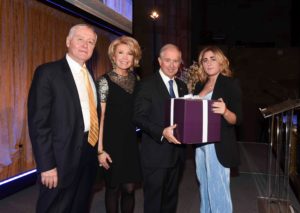
Stephen and Christine Schwarzman with Dr. Russell and Windward Alum Skylar Handler
Bennett and I were incredibly honored to be recognized alongside both Christine and Stephen Schwarzman and Anderson Cooper, each highly accomplished and caring deeply about dyslexia. Schwarzman expressing his deep admiration for the school, told the audience that “Windward is the best school of its type in the world.” He called on the school to be “outward-facing” and teach the rest of the country how best to educate students with learning issues like those experienced by students at Windward. Bennett and I were fortunate to speak with Christine and Stephen and to personally experience their warmth and wisdom and depth of true concern for all those who are dyslexic.
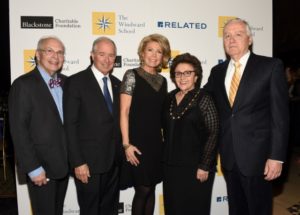
Stephen and Christine Schwarzman together with Dr. Sally Shaywitz, Dr. Bennett Shaywitz and Dr. Russell.
A special aspect of the Windward event was that it brought forth aspects of individuals, here Anderson Cooper, that were new and insightful. For example, Cooper spoke with great empathy about dyslexia while also sharing his own early difficulties with reading, and how his mother had sought the help of knowledgeable doctors and teachers and how impactful this was in his own development. In closing, Cooper with great feeling, emphasized that without these individuals, “I wouldn’t be where I am today, and I thank them every day of my life.” I have always been a great fan of Anderson Cooper, and now, even more so.
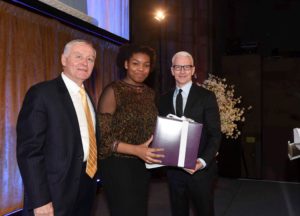
Anderson Cooper with Dr. Russell and Windward alum Yaania Bell
Related
In Praise of Breadth
We are excited to share with our YCDC family this new commentary, which is especially important for parents of a dyslexic child.
Read MoreNew Dyslexia Advocacy from Sen. Bill Cassidy
As Dr. Shaywitz emphasizes, while we always seek more knowledge, we already have sufficient knowledge to do better; rather than a knowledge gap we have an action gap that we must close.
Read MoreGood News for a Wonderful Family
YCDC Co-Director Dr. Sally Shaywitz shares some exciting news for two dyslexic students.
Read MoreThe Truth About Accommodations
The recent unsettling scandal around college admissions has cast a shadow on an innocent, hard-working, group of students – those with dyslexia who are entitled to accommodations.
Read More